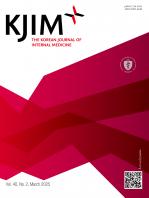|
Allergy / Original Article
Methacholine bronchial provocation test in patients with asthma: serial measurements and clinical significance
Hyun-Jung Seo, Pureun-Haneul Lee, Byeong-Gon Kim, Sun-Hye Lee, Jong-Sook Park, Junehyuck Lee, Sung-Woo Park, Do-Jin Kim, Choon-Sik Park, An-Soo Jang
Korean J Intern Med. 2018;33(4):807-814. Published online January 17, 2018
Background/Aims: The methacholine bronchial provocation test (MBPT) is used to detect and quantify airway hyper-responsiveness (AHR). Since improvements in the severity of asthma are associated with improvements in AHR, clinical studies of asthma therapies routinely use the change of airway responsi..
|
|
|
Original Article
Airway Responsiveness to Inhaled Aspirin is Influenced by Airway Hyperresponsiveness in Asthmatic Patients
Sungsoo Kim, Inseon S. Choi, Yeon-Joo Kim, Chang-Seong Kim, Eui-Ryoung Han, Dong-Jin Park, Dae-Eun Kim
Korean J Intern Med. 2010;25(3):309-316. Published online August 31, 2010
Background/AimsMany patients with aspirin-induced asthma have severe methacholine airway hyperresponsiveness (AHR), suggesting a relationship between aspirin and methacholine in airway response. This study was performed to determine whether methacholine AHR affects the respons..
|
|
|
Original Article
Airways are More Reactive to Histamine than to Methacholine in Patients with Mild Airway Hyperresponsiveness, Regardless of Atopy
Inseon S. Choi, Seok Lee, Dae-Hyeon Kim, Se-Woong Chung, Yoon-Cheol Lee, Jae-Yeong Cho, Woo-Jin Lee
Korean J Intern Med. 2007;22(3):164-170. Published online September 30, 2007
BackgroundThe airway muscles from allergen-sensitized animals in vitro show a heightened response to histamine, but not to carbachol. This study investigated whether the airway responsiveness to histamine in vivo is comparable to that of metha..
|
|
|
Original Article
Airway Hyperresponsiveness to Hypertonic Saline as a Predictive Index of Exercise-Induced Bronchoconstriction
Inseon S. Choi, Se-Woong Chung, Youngil I. Koh, Myoung-Ki Sim, Seo-Na Hong, Jang-Sik Moon
Korean J Intern Med. 2005;20(4):284-289. Published online December 31, 2005
BackgroundChanges in airway mucosal osmolarity are an underlying mechanism of bronchoconstrictive responses to exercise and hypertonic saline (HS). The purpose of this study was to examine whether an osmotic challenge test using HS can predict exercise-induced bronchospasm (EI..
|
|
|
















